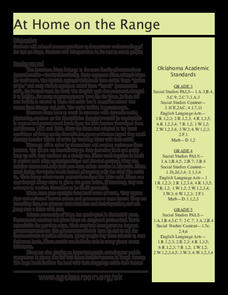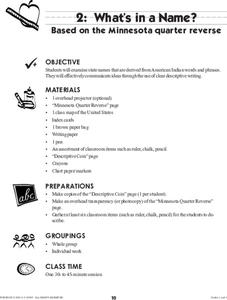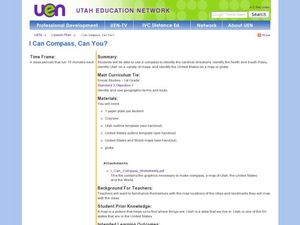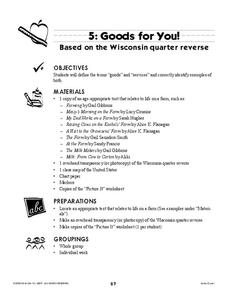Curated OER
You Can Depend On me
Discover the natural beauty of California. With a conservation bent, this activity delves into some of the attributes that make this state unique. Learners discuss Yosemite and the forest habitat. They focus on the things plants and...
Curated OER
TORNADOES!
Third graders compare the parts of a real tornado with the parts of a tornado created in a demonstration, label "Tornado Alley" on their maps, and label the locations of famous tornado disasters on their maps.
Curated OER
Thomas Jefferson and the Declaration of Independence
Students examine readings and symbols to learn about the War of Independence and Thomas Jefferson. For this War of Independence lesson, students explore the role of Thomas Jefferson in the Declaration for Independence. Students answer...
Curated OER
At Home On The Range
Students explore the history and domestication of the Bovidae family and their importance to our prairie ecosystem. Using a map of the United States, students located the American Great Plains. They complete worksheets and discuss...
Curated OER
50 State Quarter Game
Students, using their knowledge of place value and number sense, play this counting game in small groups, or as a whole class, to see who be the first person to reach 50 cents.
Curated OER
Mural Mania
Students create a mural that displays symbols for their home state. They complete worksheets and read a book about their state. They collect images of the state flower, tree and bird for the mural. There are 5 other lesson plans included...
Curated OER
Order Out of Borders
Students examine the differences between natural and man-made borders by investigating the Texas quarter. They create clay models of the state of Texas.
Curated OER
Just The Facts
Students investigate a state of choice. They conduct research looking at various important aspects of the state. The information is organized into a presentation for the class. The additional reading of target books should help students...
Curated OER
Scale Basketball
Young scholars discuss scale diagrams and maps as well as the use of spreadsheets to find the best scale to use in a model before practicing scale and ratio problems on their own.
Curated OER
What's in a Name?
Students examine state names that are derived from American Indian words and phrases. They effectively communicate ideas through the use of clear descriptive writing. The reverse of the Montana Quarter is used as inspiration for this...
Curated OER
GEOBOP State Standards
Third graders write a report and draw a picture of the state of their choice. They use the internet to research their state's flower and write a paragraph about it. They also practiced inserting a picture from the internet to a word...
Curated OER
A Place Called Fairfax
Middle schoolers use maps to locate Virginia, its surrounding states and Fairfax County. Individually, they describe the absolute and relative location of the county and why it is important to know both. As a class, they brainstorm the...
National History Day
Challenging the Status Quo: Women in the World War I Military
Why are some so resistant to change? The status quo is often to blame for a lack of forward movement in society. Following the events of World War I, women in America suddenly had a voice—and were going to use it. Scholars use the...
Curated OER
Wisconsin Snapshots
Fourth graders study Wisconsin's culture and heritage. They research the state's symbols and identify leaves common to the Wisconsin area. They create a leaf booklet and visit the state park. They visit local farms and create nature maps...
Curated OER
The Lincoln-Douglas Debates of 1858: Interactive Map Activity
Eleventh graders utilize an interactive map to explore the 1858 Senate campaign in Illinois and how factors such as population, transportation, and party strongholds can affect campaign strategies.
Curated OER
The Lincoln-Douglas Debates of 1858: Interactive Map Activity
Students utilize an interactive map to explore the 1858 Senate campaign in Illinois. They examine how factors such as population, transportation, and party strongholds can affect campaign strategies. Students write an essay discussing...
Curated OER
Coin Connections
Students examine the Illinois state quarter and review Lincoln and the fact that he is also on the penny. They color paper coins, identify their values, and create a money mobile. They play a Cent Sense game to practice which coins are...
Curated OER
I Can Compass, Can You?
Young scholars discover how to use geographic tools. In this compass lesson, students identify cardinal directions by appropriately using compasses along with a number of various maps.
Curated OER
Dark Days on the Prairie
Students explore U.S. geography by researching agriculture. For this dust bowl lesson, students complete a cause and effect worksheet based upon the dust bowls that covered a large portion of Oklahoma and Texas in the early 1900's....
Curated OER
The Civil War
Students, examine The Civil War, from a variety of perspectives and assignments. After taking notes, they can choose from creating a front page newspaper article describing the fall of Fort Sumter, discuss the pros and cons of fighting,...
Curated OER
Civil War Play Lesson Plan
Students act out the Civil War through reader's theater. In this performing arts lesson plan, students research the Civil War and find costumes, props and scenery appropriate to the time period. They become characters from the Civil War...
Curated OER
I Will Meet You In The Middle
Young scholars use the 50 States Quarter Reversal as a context of learning a curriculum concept based from the state of Utah. They research the concepts of cause and effect. Also, they use customary units of measurement to find length...
Curated OER
Just Like the Old Days
Students examine customs of rural Mongolia. They read and discuss a letter, discuss families, locate Mongolia on a map, reenact scenes from the letter, and write a prediction of how life change in rural Mongolia during the next 50 years.
Curated OER
Goods for You!
Have your class learn about Wisconsin and farming. Learners begin by listening to stories that describe farming and engage in a discussion of goods and services. They could also compare the goods and services provided in different states.























